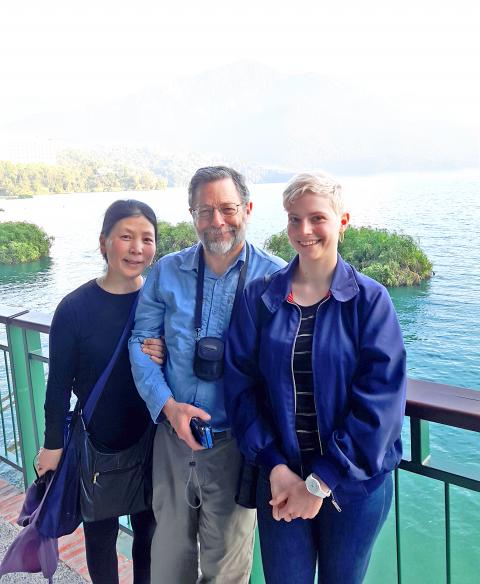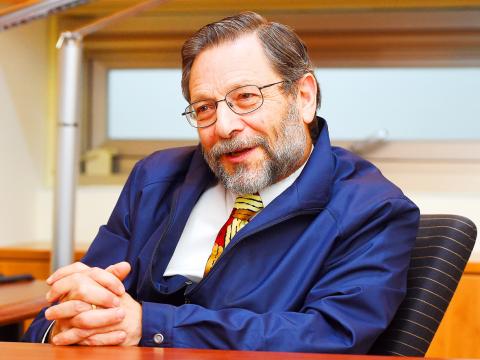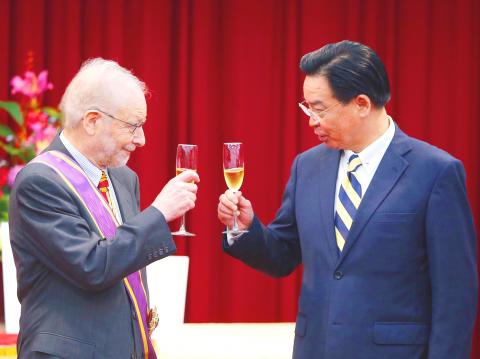J. Bruce Jacobs, the American-born Australian academic who was a giant of Taiwan scholarship, recipient of top civilian awards from the Taiwanese and Australian governments and a regular Taipei Times contributor, died yesterday afternoon in Melbourne after a years-long battle with cancer, a friend of the family told the newspaper.
The 76-year-old Jacobs first came to Taiwan in 1965 as a postgraduate student in history at National Taiwan University after earning his bachelor’s degree from Columbia University. He returned to Columbia in 1966 to pursue a master’s degree, which was awarded in 1970, and then returned to Taiwan in 1971 to conduct research for his doctorate, staying until 1973.
After earning his doctorate from Columbia in 1975, Jacobs in 1976 became a lecturer in politics at La Trobe University in Melbourne, going on to become chair in Asian studies in 1988 and founding director of its Institute of Asian Studies the following year.

Photo courtesy of Martin Williams
He also taught at Nanjing University in the late 1980s.
In 1991, he was hired by Monash University as a professor of Asian languages and studies, and over the years held several leadership positions in that department, including as director of its Taiwan Research Unit.
In 2014, he became emeritus professor of Asian languages and studies at the university.

Photo: Liao Chen-huei, Taipei Times
In addition to his research and writings on Taiwan and China, Jacobs earned his own footnote in Taiwanese history after the Feb. 28, 1980, murders of the mother and twin daughters of then-jailed provincial assemblyman Lin I-hsiung (林義雄) and the attempted murder of his third daughter, while Lin was jailed awaiting trial on charges of insurrection for helping organizing the Dec. 10, 1979, demonstration against the then-Chinese Nationalist Party (KMT) government, an event that became known as the Kaohsiung Incident.
Jacobs was a friend of the family and although Lin’s home in Taipei was under 24-hour surveillance, the government accused Jacobs of being involved in the murders and he was placed under “police protection” for three months and barred from leaving Taiwan.
After he was allowed to return to Australia, he was placed on the KMT government’s blacklist and barred from returning to Taiwan for 12 years.

Photo: CNA
Jacobs wrote about the experience in his 2016 book, The Kaohsiung Incident in Taiwan and Memoirs of a Foreign Big Beard, a reference to his local nickname, “Big Beard.”
On Nov. 16 last year, Minister of Foreign Affairs Joseph Wu (吳釗燮) awarded Jacobs the Order of Brilliant Star with Grand Cordon at a ceremony at the Ministry of Foreign Affairs in Taipei in recognition of his contributions to democratization and human rights in Taiwan.
Wu said that Jacobs had not only made “exceptional contributions to the people of Taiwan,” but was also “part of Taiwan’s history.”
On June 10, Jacobs was made a Member of the Order of Australia for his significant service to higher education, particularly in the field of Asian studies.
Jacobs’ wife, Kim Jung-sim, and his daughters Melanie, Ruth and Stephanie, were with him when he died at the family home, the Taipei Times’ source said.

CHAOS: Iranians took to the streets playing celebratory music after reports of Khamenei’s death on Saturday, while mourners also gathered in Tehran yesterday Iranian Supreme Leader Ayatollah Ali Khamenei was killed in a major attack on Iran launched by Israel and the US, throwing the future of the Islamic republic into doubt and raising the risk of regional instability. Iranian state television and the state-run IRNA news agency announced the 86-year-old’s death early yesterday. US President Donald Trump said it gave Iranians their “greatest chance” to “take back” their country. The announcements came after a joint US and Israeli aerial bombardment that targeted Iranian military and governmental sites. Trump said the “heavy and pinpoint bombing” would continue through the week or as long

TRUST: The KMT said it respected the US’ timing and considerations, and hoped it would continue to honor its commitments to helping Taiwan bolster its defenses and deterrence US President Donald Trump is delaying a multibillion-dollar arms sale to Taiwan to ensure his visit to Beijing is successful, a New York Times report said. The weapons sales package has stalled in the US Department of State, the report said, citing US officials it did not identify. The White House has told agencies not to push forward ahead of Trump’s meeting with Chinese President Xi Jinping (習近平), it said. The two last month held a phone call to discuss trade and geopolitical flashpoints ahead of the summit. Xi raised the Taiwan issue and urged the US to handle arms sales to

State-run CPC Corp, Taiwan (CPC, 台灣中油) yesterday said that it had confirmed on Saturday night with its liquefied natural gas (LNG) and crude oil suppliers that shipments are proceeding as scheduled and that domestic supplies remain unaffected. The CPC yesterday announced the gasoline and diesel prices will rise by NT$0.2 and NT$0.4 per liter, respectively, starting Monday, citing Middle East tensions and blizzards in the eastern United States. CPC also iterated it has been reducing the proportion of crude oil imports from the Middle East and diversifying its supply sources in the past few years in response to geopolitical risks, expanding

An Emirates flight from Dubai arrived at Taiwan Taoyuan International Airport yesterday afternoon, the first service of the airline since the US and Israel launched strikes against Iran on Saturday. Flight EK366 took off from the United Arab Emirates (UAE) at 3:51am yesterday and landed at 4:02pm before taxiing to the airport’s D6 gate at Terminal 2 at 4:08pm, data from the airport and FlightAware, a global flight tracking site, showed. Of the 501 passengers on the flight, 275 were Taiwanese, including 96 group tour travelers, the data showed. Tourism Administration Deputy Director-General Huang He-ting (黃荷婷) greeted Taiwanese passengers at the airport and